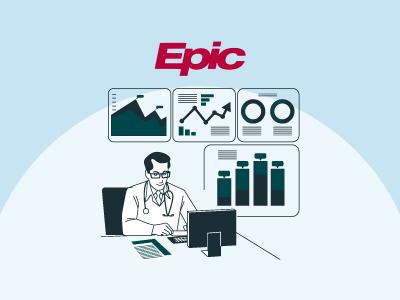
Epic EMR is a leading electronic medical records system that helps healthcare organizations streamline workflows and improve patient care. According to the U.S. Acute Care EHR Market Share 2024 report from KLAS, Epic is the only vendor to see a net increase in market share, which highlights its growing adoption across the industry. This platform not only offers a comprehensive suite of reporting tools but also creates an ecosystem where data is readily available and visually accessible.
Many hospitals and health systems rely on Epic’s reporting tools to enhance efficiency, improve resource management, and cut unnecessary costs.
In this guide, we will explore how Epic EMR’s advanced healthcare data analytics and automation capabilities help healthcare organizations work smarter and deliver more individualized, evidence-based care.

Epic EMR uses artificial intelligence (AI) to convert large amounts of data into actionable insights through intelligent automation. It provides a library of pre-built clinical, operational, and financial algorithms that can be customized to meet specific needs.
Healthcare providers can also create their own algorithms to address unique challenges, which enables more accurate data analysis and error-free healthcare management.
The vendor offers a variety of dashboards that allow healthcare teams to visualize and track critical data in real time. These time-saving EMR tools help organizations enhance decision-making, optimize resource management, and improve overall efficiency. Additionally, it supports customizable views to let users focus on the most relevant data tailored to their specific needs.
Centura Health used Epic dashboards and cost data analysis to update preference cards, helping OR teams reduce disposable supply expenses and achieve $1.4 million in savings within a year. Similarly, Lehigh Valley Health Network used its Capacity Management Dashboard to improve patient flow, cutting ED length of stay by 5% and transfer wait times by nearly 35%.
Epic's self-service reporting tool, SlicerDicer, allows users to explore both longitudinal and real-time data independently, without the need for custom report generation. This empowers clinicians to explore data on their own, enabling faster, more efficient decision-making. Users can easily generate actionable insights directly from the data and drill down into the specifics they need.
WellSpan Health's Case Study
A case study from WellSpan Health highlights the impact of SlicerDicer. Previously, the organization relied on a ‘drive-through' reporting model, where reports were created on demand by the analytics team. This approach, while efficient, led to limited engagement with the data.
By shifting to SlicerDicer’s self-service model, WellSpan saw a significant increase in active users, from just over 40 to over 400 each month. This change empowered users to independently explore data and draw conclusions for more actionable insights and improved decision-making.
Cosmos is a vast dataset created in collaboration with health systems using Epic, designed to drive medical discoveries and improve patient care. It pools de-identified patient data to generate real-world insights, helping clinicians make informed decisions at the point of care.
With data from over 1,600 hospitals and nearly 38,000 clinics, providers can compare treatment outcomes, collaborate on rare cases, and tailor care plans based on evidence from millions of patients.
Key Features
Epic’s Peer Benchmarks feature allows healthcare organizations to compare their clinical, operational, and financial performance with similar providers. It helps identify trends, highlight areas for improvement, and support data-driven decision-making. Organizations can easily use these insights from Epic EMR to optimize workflows, enhance patient care, and achieve error reduction.
Epic’s advanced reporting tools empower healthcare organizations to streamline workflows, reduce errors, and support evidence-based decision-making at the point of care. The platform uses AI in EHR to enhance data analysis and includes automated medical reporting features for customizable insights.
Recognized as the top health system suite in the 2025 KLAS report, Epic continues to set the standard for innovation in healthcare technology. This recognition highlights its lasting impact on the healthcare industry and its commitment to improving patient care through powerful, data-driven tools.
You can also check out our comprehensive guide on Epic EMR features to learn more about the software’s capabilities and how it can help healthcare organizations improve clinical workflows.
